The Scribbler Blu-ray Movie
HomeThe Scribbler Blu-ray Movie 
XLrator | 2014 | 89 min | Rated R | Oct 21, 2014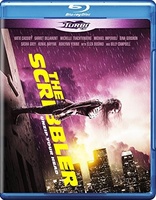
Movie rating
6.1 | / 10 |
Blu-ray rating
| Users | 0.0 | |
| Reviewer | 3.0 | |
| Overall | 3.0 |
Overview
The Scribbler (2014)
A young woman is facing her destructive multiple personalities using an experimental new procedure known as "The Siamese Burn."
Starring: Katie Cassidy, Eliza Dushku, Michelle Trachtenberg, Sasha Grey, Billy CampbellDirector: John Suits
| Thriller | Uncertain |
| Mystery | Uncertain |
| Psychological thriller | Uncertain |
| Sci-Fi | Uncertain |
| Comic book | Uncertain |
Specifications
Video
Video codec: MPEG-4 AVC
Video resolution: 1080p
Aspect ratio: 2.35:1
Original aspect ratio: 2.39:1
Audio
English: DTS-HD Master Audio 5.1 (48kHz, 24-bit)
Subtitles
English SDH
Discs
25GB Blu-ray Disc
Single disc (1 BD)
Playback
Region A, B (C untested)
Review
Rating summary
| Movie | 2.5 | |
| Video | 4.5 | |
| Audio | 4.5 | |
| Extras | 0.5 | |
| Overall | 3.0 |
The Scribbler Blu-ray Movie Review
Keep Writing
Reviewed by Michael Reuben October 27, 2014Maybe some graphic novels should stay on the page. The artist working with pen and ink (or stylus and pixels) has much greater freedom to reshape and reinvent the world than a director working with actors, wardrobe, props and sets. Readers are generally more willing to suspend disbelief than movie viewers, because readers expect to participate in visualizing the writer's world, whereas movie viewers want the filmmaker to create a credible world ready for their eyes and ears to absorb—which means that a film has to let audiences know at the outset what kind of world they're entering. One of the best film adaptations of a graphic novel to date, Robert Rodriguez's Sin City, cued in viewers instantly by creating a cinematic vocabulary that replicated the look and feel of comic panels. Others have reinvented a graphic novel's story in an established film genre, e.g., the Hughes Brothers' From Hell , which took the form of a historical costume drama, but added an extra layer of stylized sheen to signal the film's respect for its source material. The Scribbler, adapted by British writer and artist Dan Schaffer from his graphic novel of the same name, takes the form of a police procedural to tell what is either a superhero origin story or a parable about the thin line between madness and sanity (or possibly both). The fact that the story is ambiguous may be deliberate, but not all ambiguity is artistically advantageous. The police procedural format conveys the sense that the film is set in a world with at least a semblance of social order, but nothing about the world that director John Suits puts on screen makes any sense. Suits simply places two-dimensional characters in a live-action setting and has them behave as they would in a comic-book world. He gets away with this approach for a while by having a criminal psychologist explain that we're seeing things from the perspective of the disturbed individual who is the chief suspect in a series of murders. But since Schaffer's story is about madness, treatment and recovery, that explanation only takes us so far. The Scribbler involves a real mental hospital, real patients, a real halfway house, a real doctor and real people who die. Eventually those "just the facts, ma'm" realities have to be confronted. By the time that moment arrives, the film falls apart, because Schaffer and Suits haven't built a credible world in which to resolve their story, despite an impressive cast working hard to breathe life into roughly sketched characters.
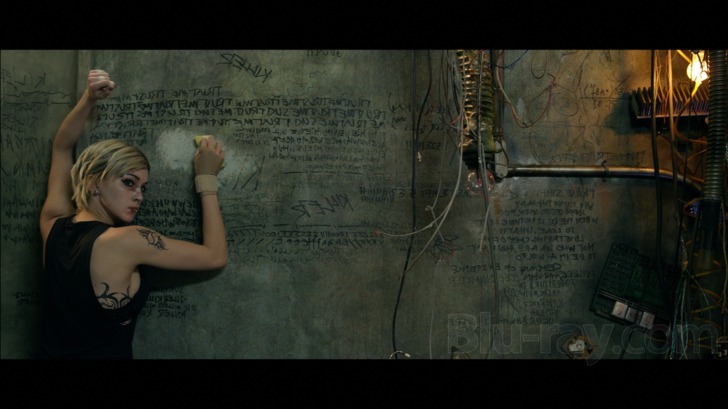
The heroine of The Scribbler is Suki (Katie Cassidy, Arrow), who suffers from multiple personality disorder. Suki spends most of the film telling her story to a skeptical police detective named Moss (Michael Imperioli, The Sopranos), who doesn't believe a word she says, and a sympathetic criminal psychologist, Silk (Eliza Dushku, Dollhouse), who sees Suki's tale as a fantasy rife with "metaphor". People have died, although their identities are only gradually revealed as the film unfolds. Moss thinks Suki killed them; Silk is willing to reserve judgment. Institutionalized under the care of Dr. Sinclair (Billy Campbell), Suki was treated with a revolutionary modification of electroshock therapy called "the siamese burn", in which a portion of the brain inhabited by a specific alternate identity is targeted and destroyed. (How those areas are identified is never discussed.) For some inexplicable reason, Dr. Sinclair decides to release Suki to a halfway house while she still has many alters to be eliminated. No problem, though. He gives her a portable "burn" unit and makes her promise to keep giving herself shock treatments. There's even a counter that shows how many alters Suki has eliminated. When it reaches zero, she'll be cured. (Maybe for his next project, Dr. Sinclair can design a home lobotomy kit.) The halfway house into which Suki moves is a curious affair: a large apartment complex with a tall central tower that could house hundreds of patients but appears to be devoid of medical or supervisory personnel. It also has only about half a dozen residents, making you wonder what's happening with all that empty space. Cleaning and routine maintenance appear not to be concerns, and forget about the fire safety code. The small apartment to which Suki is assigned is barely a step up from a tweakers' hangout on Breaking Bad. If this is where Dr. Sinclair sends all his patients for residential treatment, it's a wonder he's managed to keep his license. Suki's apartment is on the top floor, which is considered desirable because of its convenience for suicides. Indeed, one resident jumps just as she arrives. The suicide surprises her less than finding a former acquaintance from the asylum in residence, a hound dog named Hogan (Garret Dillahunt), who should have left the halfway house long ago but faked a suicide so that he'd be able to stay. Hogan has discovered that vulnerable women with psychological problems are easy to bed. (Suki, for example, tells him no, but then one of her alters emerges and says yes.) Among the easy pickings in residence are Emily (Ashlynn Yennie) who is both a snob about fashion and pathologically allergic to wearing any clothing; "Bunny" (former porn star Sasha Grey), so named for her preference in headgear; Cleo (Gina Gershon), who, like her namesake, has a thing for snakes and milk baths; and Alice (an unrecognizable Michelle Trachtenberg), who claims the stairways as her personal domain. As if all this weren't complication enough, one of Suki's alters may be more than just a psychological construct. Known as the Scribbler, this alter doesn't speak but covers every available surface in backward writing, much of it clearly intended as a message to Suki. By the time Dr. Sinclair's "siamese burn" has counted down to the number two, Suki is no longer sure whether she or the Scribbler is the real her, which begs the question of what the Scribbler is and where she (or it) came from. Dr. Sinclair seems to have ideas on the subject, as revealed in fragments of recorded discussions of Suki's case with junior colleagues, including Karim, whose voice is instantly recognizable as that of Kunal Nayar from The Big Bang Theory. The Scribbler toys with interesting possibilities, but they remain mostly theoretical, because they never make a solid connection with the film's narrative. Suki, we discover, isn't mad so much as special. Then again, part of the film's message is that we all could be special, if we weren't trying so hard to be normal. It's the same romanticized view of madness that, since the Greeks' worship of Dionysus, keeps popping up in every art form that Western society has produced.
The Scribbler Blu-ray Movie, Video Quality 
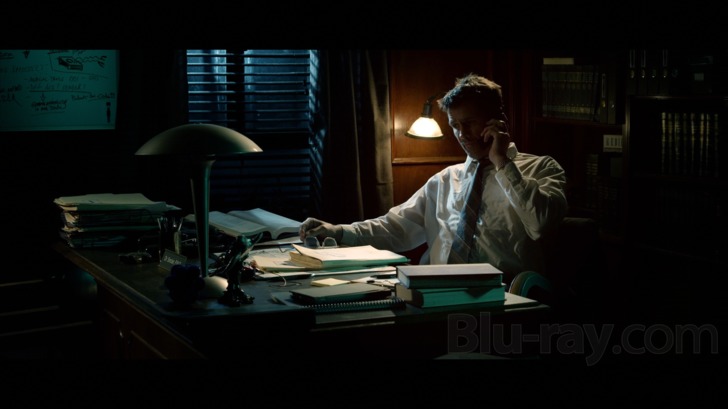
According to the end credits, The Scribbler was shot on a Red camera with Panavision lenses. The director of photography was Mark Putnam (Growth). Post- production was completed on a digital intermediate, including integration of major effects work. XLrator Media's 1080p, AVC-encoded Blu-ray was presumably sourced from digital files. As is generally the case with digitally originated projects, the image is sharp, clean and detailed, with deep blacks that are especially important for critical night scenes and dark interiors, especially anything concerning the character of Alice, who hides behind jet-black hair and dark glasses. At the opposite end of the brightness spectrum are the flashes of light that blast out of Suki when she uses the "siamese burn" device; the Blu-ray handles these capably as well. The film's color palette favors sickly greens and yellows, the better to make the halfway house look as unappealing as possible. Without any real extras to consume space, XLrator has mastered the 89-minute film with an average bitrate of 27.98 Mbps, which is generous for Red footage. Certainly the image doesn't suffer from compression issues.
The Scribbler Blu-ray Movie, Audio Quality 
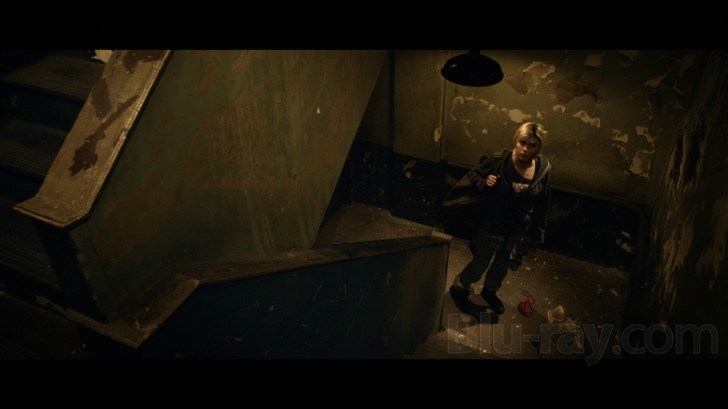
Except toward the very end, The Scribbler has nothing like an action scene to challenge its lossless DTS-HD MA 5.1 soundtrack. But Suki constantly hears multiple voices inside her head, as her various personalities struggle for control, and the sound mix bounces them back and forth throughout the speaker array, so that the viewer experiences the internal conflict much like Suki does. Unexpected external sources sometimes address her as well, and the mix locates these sounds appropriately. The halfway house's various spaces (elevator, hallway, stairwell, etc.) have distinctive sonic environments, as do the police station and several other more unusual locales that I prefer not to specify. In general, The Scribbler's mix makes good use of the 5.1 system, with wide dynamic range and effective reproduction of dialogue. The atmospheric score is by Alec Puro (Higher Ground).
The Scribbler Blu-ray Movie, Special Features and Extras 

Other than the film's trailer (1080p; 2.35:1; 1:45), the disc has no extras. At startup, the disc plays trailers for Ironclad: Battle for Blood, The Machine, Housebound and the as-yet-unreleased Poker Night, which can be skipped with the chapter forward button and are otherwise not available once the disc loads.
The Scribbler Blu-ray Movie, Overall Score and Recommendation 
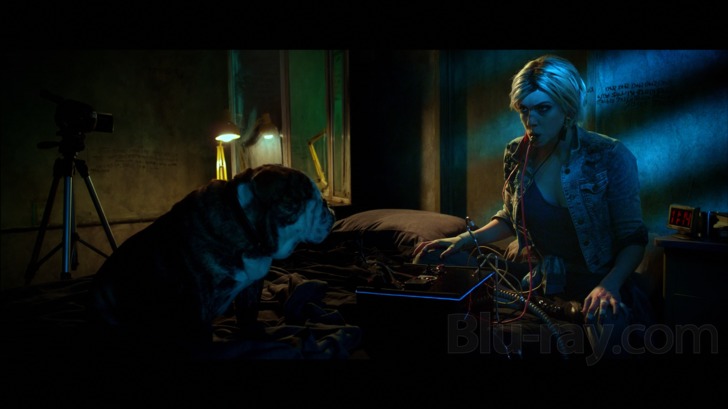
It's possible that viewers intimately familiar with Dan Schaffer's original graphic novel of The Scribbler will bring more knowledge of the backstory to bear on the film and, as a result, fill in various blanks and have a more satisfying experience. But a film should stand on its own, and The Scribbler fails at the basic task of creating a self-contained fictional world into which the viewer can trustingly enter, checking disbelief at the door. It contains some interesting performances and momentarily startling effects, but the whole is less than the sum of its parts. Not recommended.
Similar titles
Similar titles you might also like

Proxy
2013

Sisters
1972

Primal Scream
1987

Distorted
2018

Narcopolis
2015

Session 9
2001

The Exorcist III 4K
Collector's Edition | + Director's Cut on BD
1990

Psych:9
2010

The Dead Center
2018

The Mad Magician 3D
1954

Don't Answer the Phone!
1980

Hellraiser: Hellseeker
Hellraiser VI
2002

Wolfen
Warner Archive Collection
1981

The Invisible Man 4K
2020

A Dragonfly for Each Corpse
Una libélula para cada muerto
1975

The Return of Doctor X
Warner Archive Collection
1939

Regression
2015

Don't Let Go
2019

Luz
2018

Lovely Molly
2011